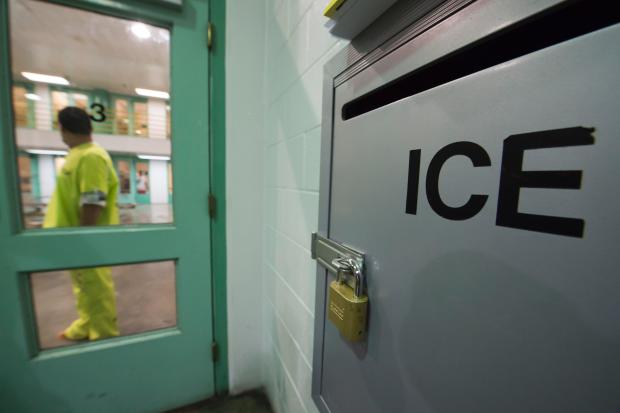
An official stated that ICE may have to release a large number of migrants if they do not receive additional funding from Congress.
A high-ranking official from U.S. Immigration and Customs Enforcement revealed to CBS News on Wednesday that due to a lack of funding from Congress, the agency is contemplating reducing its detention capacity and freeing numerous migrants from custody.
If there is not enough money, authorities may have to set free approximately 4,000 to 6,000 individuals from immigration detention centers that are meant for long-term stays. The official, who wanted to keep their identity private while discussing budget cuts, shared this plan for saving costs.
ICE oversees a network of county jails and for-profit prisons across the U.S. to detain migrants it is seeking to deport, such as those who cross the southern border illegally or immigrants transferred to the agency after being charged or convicted of crimes. As of the end of January, ICE was detaining more than 38,000 immigrants, most of them recent border-crossers, agency data show.
Last year, the Biden administration requested emergency funding from Congress in order to provide billions of dollars for ICE activities such as deportations, arrests, detention facilities, and technology for tracking migrants. However, Congressional Republicans opposed this request.blocked
The White House and a select group of senators have reached a bipartisan border policy agreement, along with securing funds for it. However, some have expressed dissatisfaction with the deal, citing that it does not impose strict enough limits on asylum.
“Tough decisions”
In a recent press conference, interim director of ICE Patrick Lechleitner stated that the agency may need to make difficult choices in the future if they do not receive additional funding.
The possible release of numerous immigrants, initially disclosed by The Washington Post, is not definite. The Department of Homeland Security, which manages ICE, may still reallocate funds from other sub-agencies, like the U.S. Coast Guard, to cover the budget shortfall.
According to a DHS spokesperson, Erin Heeter, in a statement to CBS News, warned that scaling back ICE operations would have a detrimental impact on border security, national security, and public safety.
In the event of insufficient funds, Heeter stated that DHS would reallocate or withdraw resources from other initiatives to finance ICE, U.S. Customs and Border Protection, and U.S. Citizenship and Immigration Services. These agencies have also requested billions of dollars in extra funding.
“The DHS has consistently appealed for more support to carry out its crucial responsibilities along the southwest border, yet Congress has consistently failed to allocate sufficient funding,” stated Heeter. “Most recently, Congress dismissed a bipartisan national security bill, jeopardizing the current removal operations of the DHS, adding more strain to our already overburdened staff, and hindering our ability to intercept fentanyl at ports of entry.”
The lack of funds could also hinder ICE’s attempts to remove non-asylum seekers or individuals who are not eligible for refuge in the United States, which is a key component of the Biden administration’s plan to decrease the unprecedented number of illegal border crossings in recent years.
Although there was a 50% decrease in illegal crossings along the southern border in January compared to the record high of 250,000 in December, there has been an increase in migrant arrivals in February. This trend is expected to continue into the spring, as migration typically increases during this time of year.
DHS officials stated that the insufficient funding would impact other aspects of the extensive American immigration system, such as border surveillance technology and the handling of legal immigration benefits, including green cards and asylum applications.
Last year, the Federal Emergency Management Agency (FEMA) program that offers financial assistance to cities and organizations for accommodating and feeding migrants released from Department of Homeland Security (DHS) custody, also depleted its funds. Numerous Republicans opposed the bipartisan border agreement’s allocation of additional funds for this program, arguing that it incentivizes entities that promote illegal immigration.
Reporting was contributed by Nicole Sganga.
More
Source: cbsnews.com
